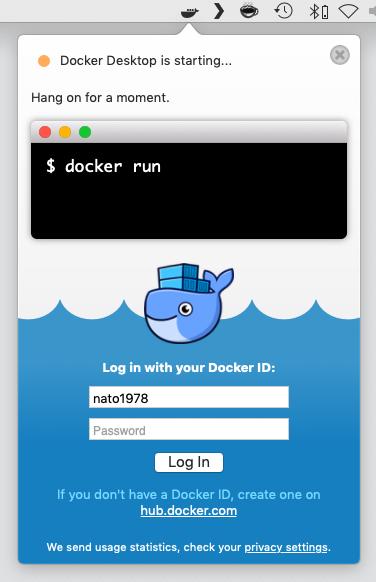
Docker For Mac Update Error

Join GitHub today
Expected behavior Actual behavior Information Docker for Mac: version. Failure: com.docker.slirp is not runni. Updating docker #2035.
GitHub is home to over 50 million developers working together to host and review code, manage projects, and build software together.
Sign upHave a question about this project? Sign up for a free GitHub account to open an issue and contact its maintainers and the community.
By clicking “Sign up for GitHub”, you agree to our terms of service and privacy statement. We’ll occasionally send you account related emails.
Already on GitHub? Sign in to your account
Labels
Comments
commented Oct 24, 2019
Expected behaviorAble to update the Docker for desktop from v2.0.0.3 to 2.1.0.4 Actual behaviorGetting a Fatal Error message when attempting to update. InformationPlease, help us understand the problem. For instance:
Diagnostic logsUnable to start Docker for desktop. So, no logs can be provided. Steps to reproduce the behavior
|
added the version/10.15 with the stabilization update label Oct 24, 2019
commented Jan 22, 2020
Issues go stale after 90d of inactivity. Prevent issues from auto-closing with an If this issue is safe to close now please do so. Send feedback to Docker Community Slack channels #docker-for-mac or #docker-for-windows. |
added the lifecycle/stale label Jan 22, 2020
closed this Feb 21, 2020
Sign up for freeto join this conversation on GitHub. Already have an account? Sign in to comment
-->
With Visual Studio for Mac, you can easily build, debug, and run containerized ASP.NET Core apps and publish them to Azure.
Prerequisites
Installation and Setup
For Docker installation, review and follow the information at Install Docker Desktop for Mac.
Creating an ASP.NET Core Web Application and Adding Docker Support
- Create a new solution by going to File > New Solution.
- Under .NET Core > App choose the Web Application template:
- Select the target framework. In this example we will use .NET Core 2.2:
- Enter the project details, such as name (DockerDemo in this example). The created project contains all the basics you need to build and run an ASP.NET Core web site.
- In the Solution Pad, right click the DockerDemo project and select Add > Add Docker Support:
Visual Studio for Mac will automatically add a new project to your solution called docker-compose and add a Dockerfile to your existing project.
Dockerfile Overview
A Dockerfile is the recipe for creating a final Docker image. Best planner app for mac. Refer to Dockerfile reference for an understanding of the commands within it.
The preceding Dockerfile is based on the microsoft/aspnetcore image, and includes instructions for modifying the base image by building your project and adding it to the container.
Note
The default Dockerfile created by Visual Studio for Mac exposes Port 80 for HTTP traffic. To enable HTTPS traffic, add Expose 443 to the Dockerfile.
Debugging
Select the docker-compose project as the Startup Project and start debugging (Run > Start Debugging). This will build, deploy and launch the ASP.NET project in a container.
Tip
On the first run after installing Docker Desktop, you may receive the following error when trying to debug: Cannot start service dockerdemo: Mounts denied
Add /usr/local/share/dotnet/sdk/NuGetFallbackFolder to the File Sharing tab in Docker Desktop:
To do this, a general terminal or ais normally used. Naturally, the terminal or the PC that is running a terminalemulator must be connected to the server or mainframe computer.There are various different methods that can be used to connect the terminal tothe server. In most cases, the purpose of this connection is toallow a user access to the server's shell.A telnet client is the hard- or software, that is used on the userside and which enables the user to interact with a server throghthe telnet protocol.Note: Since telnet is an unencrypted connection method, thetelnet protocol has been superceded by the SSH protocol.Except for legacy use cases and special situations, in mostcases today ais used instead. Among these methods are serial cables, modems and existing local areaand wide area networks.For a long time, the most common network-based connection method was Telnet, astandard protocol for making text-based connections between two differentcomputers.Nevertheless, Telnet has one major drawback: all data is exchanged withoutany form of encryption.In a small corporate environment where LAN cables and infrastructure are controlledby the owners, today Telnet may well be barely sufficient. What is Telnet?In client/server computing, you need to be able to send data to and receive datafrom a host. Telnet clients for mac 10.14.
When the build is completed, the application will be launched in Safari:
Note that the container will be listening on a port, http://localhost:32768 for example, and this port may vary.
To see the list of running containers, use the docker ps command in Terminal.
Note the port relay in the screenshot below (under PORTS). This shows that the container is listening on the port we saw in Safari above and relaying requests to the internal webserver on port 80 (as defined in the Dockerfile). From the application's perspective, it is listening on port 80: